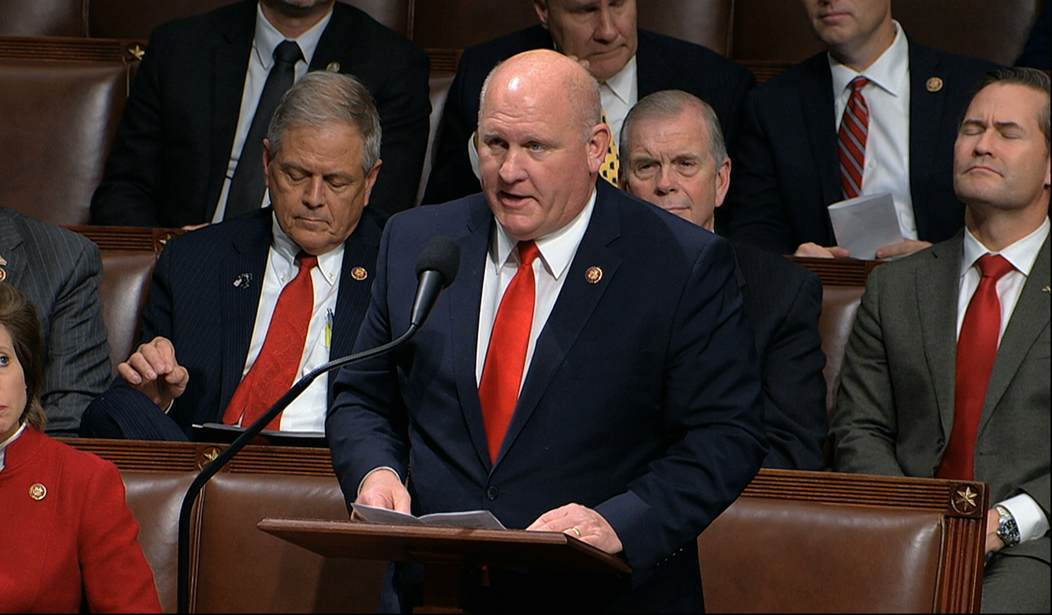Visiting Congress after the election of a new Speaker of the House is a surreal experience. After three weeks of endless reports of “Republican chaos,” the mood - especially in House Agriculture Chairman Glenn “GT” Thompson’s office - is visibly calm.
“Our work didn't come to a screeching halt without a Speaker. It was just made a little more difficult, a little more complex,” Rep. Glenn Thompson (R-PA) told me. “Our committee work has just been going well.”
Although Congress was temporarily stalled, Chairman Thompson says committee work didn’t rest one bit. Priorities, like the 2023 Farm Bill reauthorization, were being worked on behind-the-scenes.
Thompson heaped boundless praise on new House Speaker Mike Johnson (R-LA) and remarked he was “thrilled” that Johnson’s legislative calendar includes prioritizing the passage of the 2023 Farm Bill reauthorization next month.
Rep. Thompson has represented Pennsylvania’s 15th Congressional District since 2019 and previously the Keynote State’s 5th Congressional District from 2008 to 2018. Readers may recognize his district for being home to Penn State, the Allegheny National Forest, Marcellus Shale natural gas reservoirs, and Pennsylvania’s elk herd in Benezette. In 2021, I spent some time there reporting on the fracking industry for my CFACT “Conservation Nation” video series to see the process firsthand and jobs that depend on the industry.
The Agriculture Committee is chiefly tasked with advancing policies involving farming, ranching, and rural interests but also handles newer commodities – including digital assets like cryptocurrency.
I asked the Pennsylvania lawmaker, who is descended from a long line of dairy farmers, about the role farmers and ranchers serve and why preservationist environmentalists unfairly castigate them as despoilers of nature.
Recommended
“There are no greater climate champions in the world than the American farmer, rancher, and forester,” said the House Agriculture chairman. “There's data out there that shows that combined at this point–what we do in America–those American farmers…they sequester an average of 6.1 Gigatons of carbon annually—which is 10.1% more than what they emit, which means there's no better climate champion.”
As former Environmental Protection Agency (EPA) chief-of-staff Mandy Gunsakera noted in a recent policy focus, “Farming accounts for 10 percent of total greenhouse gas emissions in the U.S. Globally, agriculture accounts for 33 percent of emissions. More recent criticisms of the industry ignore the significant progress already made. Since 1990, farmers have cut Greenhouse Gas (GHG) emissions while increasing overall production. One analysis found that farmers today are producing 80 percent more pork, 48 percent more milk, and 18 percent more beef. Over the same 30 year history, farmers have cut GHG emissions per unit of food by 24 percent. Most farmers will admit there is room for improvement, but a wholesale transition for this industry is unjustified.”
I then asked about concerns surrounding the Chinese Community Party (CCP) gobbling up farmland near sensitive locations including military installations. While Canada and Mexico are the largest foreign holders of U.S. agricultural lands, the CCP– namely entities tied to them–are purchasing U.S. farmland at an alarming rate.
Thompson mentioned the committee is studying the issue and following the actions of South Dakota and Virginia that are proactively leaning on pre-existing limitations in place. He argued that the act of CCP entities acquiring farmland could result in food insecurity.
He said the U.S. could “reach a critical mass point where you would put us in a position of food insecurity” if American farmers or agribusinesses aren’t involved in operations.
Then we discussed his top legislative priority–the 2023 Farm Bill–that is set to expire soon. I asked how he intends to keep the bill free of, for example, extreme climate provisions that would undermine producers and their agricultural output.
“This will be a Farm Bill that will be bipartisan, bicameral, and highly effective,” he insisted. “And we do that by making the bill tri-partisan.”
Tri-partnership, Thompson explained, involves stakeholder input like this: “Republicans, Democrats, and the American people.”
“There's no new dollars, so we got to figure out how within existing [monies]–what’s spent in Washington–how do we fund those,” he added.
One of the most popular components of the Farm Bill is the Conservation Reserve Program (CRP) – a program that was established in 1985 during the Reagan administration. CRP is administered by the Farm Service Agency (FSA) and is one of the largest successful private land efforts in the U.S. incentivizing voluntary participation from farmers, ranchers, and landowners. Originally crafted to address soil erosion, CRP is also credited with success in bolstering water quality and wildlife habitat, as well.
Chairman Thompson lauded CRP’s successes and said they are a testament to effective private-public partnerships.
“Our conservation programs are successful because they are locally-led and voluntary,” he noted. “There have been more endangered and threatened species delisted through USDA Farm Bill-provided voluntary and locally-led conservation programs than the Fish and Wildlife [Service] could ever hoped to achieve.”
“If you achieve better soil health, you increase productivity. You increase productivity, you increase profitability. And so the conservation programs are very effective tools.”

























Join the conversation as a VIP Member